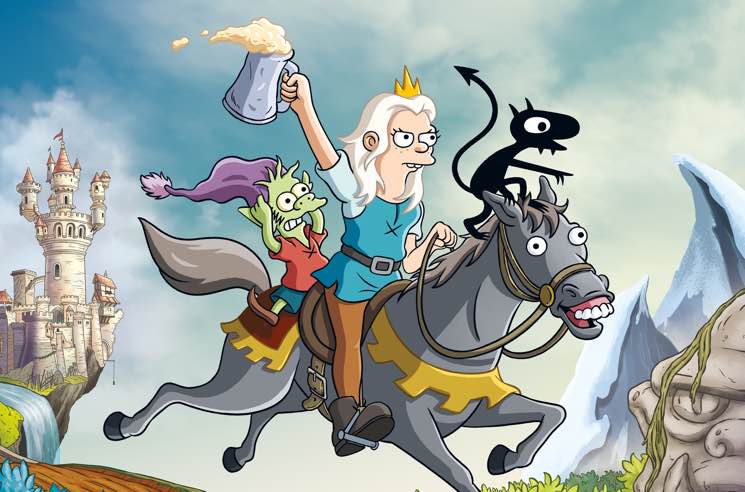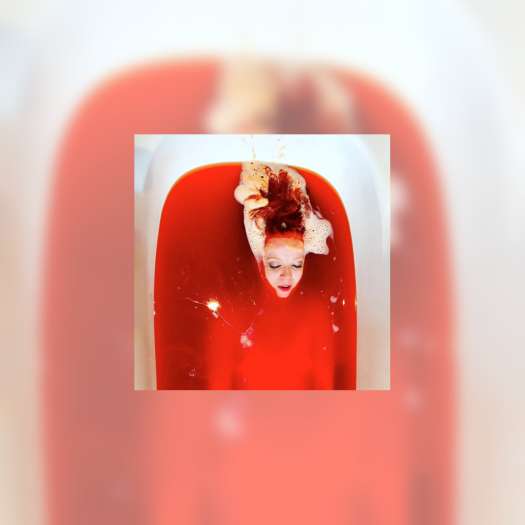Adhering to a rich tradition of adolescent outsiders, Matthew Abraham Groening spent his formative years devouring weirdo art and dreaming of disrupting the zeitgeist. "I've been thinking about how to sneak into pop culture since I was a teenager laying on my bed, listening to Frank Zappa, the Bonzo Dog Band and the Fugs," he says.
In a sense, the rest is history — he's since dominated comedy via two wildly successful TV series and a cult classic comic strip (with some recent controversy along the way). But his third TV show (and first for Netflix), Disenchantment, brings his career full circle, back to that Oregon bedroom. "The original idea actually started in high school," Groening says. "I used to draw a comic strip for my friends called Tales of the Enchanted Forest that had all sorts of talking animals in it. It was actually more influenced by Walt Kelly's daily comic strip Pogo. And it's always stuck in the back of my mind that I would do something with that basic inspiration."
As he developed his art style and comic sensibility, Groening quickly demonstrated a knack for world-building, and his cult comic strip, Life in Hell, caught the attention of The Tracey Ullman Show, who commissioned a series of shorts. Hoping to retain ownership of Hell bunnies Binky and Bongo, Groening made up The Simpsons on the spot, accidentally creating one of the most successful media properties of all time. Decades later, he still refers to the show as "a fluke."
Groening has since become synonymous with all the good parts of Gen X pop culture (and some of the bad), from The Simpsons' acerbic wit to Futurama's unabashed geekiness and Life in Hell's scathing, pointed and downright prescient deconstruction of American hypocrisy. Imbued with irony, sarcasm and a general sense of malaise, Groening defined '90s comedy writ large. "That's one of the most amazing compliments ever," he says reluctantly. "I don't really think about it that much because I'm just racing to a deadline."
Yet Disenchantment is decidedly more earnest. "For this project, I sat down with Josh Weinstein, who developed the show with me, and we agreed that we were going to lay out the series dramatically — that is, to tell dramatic stories — and then add jokes, rather than just be goofy from the get go." In other words, it's as much a story-driven fantasy adventure as it is an animated comedy. "Which is not to say that, you know — we can't help but throw in the sarcasm and the snideness," Groening continues. "But we tried to stay as far as possible away from parody."
Set in the medieval fantasy world of Dreamland, Disenchantment follows the rambunctious Princess Bean (voiced by Broad City's Abbi Jacobson), who gets into a series of misadventures with her doe-eyed companion Elfo (Nat Faxon) and her mischievous "personal demon" Luci (Eric Andre). As with Groening's previous projects, the show's main characters quickly establish a winning camaraderie, giving the show plenty of personal stakes to root for.
There are much larger stakes, too. Like Springfield and New New York before it, Dreamland is the sort of malleable (and beautifully rendered) cartoon world that's brimming with possibility. "There's an opportunity to really do an epic universe with hundreds, if not thousands, of characters," he says. "Different kingdoms and species and dwarves and elves and trolls and nymphs and leprechauns — and those are just the people under three feet tall. And I haven't gotten into the cyclopses and the giants and the talking trees."
Unlike other contemporary comedies, Disenchantment resists the temptation to draw obvious parallels to present political climate. (Within the press screeners sent out, there's no brutish orange emperor demanding to make the forest great again.) That said, Groening says there's still plenty of present-day relevance to Disenchantment. "Everything is about today," he says. "Futuristic science fiction is about right now. You can't help it. I don't think it's quite as overt as we could be, and we resisted that temptation. But I think you can find some political points in the show."
Most notably, Disenchantment finally sees Groening utilize a female lead. "If there are any overt politics, it's that it's got a definite feminist point of view," Groening says. "And having a woman at the centre of the show is just, for me, a refreshing way to tell stories." Groening credits Bean's lovable fierceness to the character's voice actor. "Abbi Jacobson brings a really strong point of view," he admits. "You try to write the funniest or most moving lines you can, and then you have Abbi Jacobson come in and riff on it and take it to a different place and you go, 'Oh my God. It's ten times better than anything we could have thought of…' She ad-libbed some of the best lines, making the feminist bent to the show even more overt."
Disenchantment's feminism is sadly a far cry from the current Simpsons talking point. For 28 years, the show's divisive Kwik-E-Mart owner Apu Nahasapeemapetilon has been voiced by Hank Azaria, a white man who has openly admitted that the character was conceived to be as offensive as possible. Though the "equal opportunity offender" defence is a common one among Gen X comedians, Hari Kondabolu observed that the character was a launch-pad for bullying members of the South Asian diaspora throughout the '90s. Kondabolu's documentary The Problem with Apu struck such a nerve that Azaria, decades later, finally offered to step down from the role.
Despite the leftie flag-waving of Life in Hell and other progressive politics championed through his life and work, Groening is the only Simpsons honcho still holding out for Apu, either stonewalling interviewers or telling The New York Times that the debate is "clunky" and "tainted," adding that Apu's name was a signpost intended to raise awareness about Satyajit Ray's Apu film trilogy.
Regardless of intentions, however, couldn't the problem with Apu have been solved if he was played by a South Asian actor? After all, by Groening's own admission, casting Jacobson as a feminist princess was a win-win for the role and the show. Isn't this all just a question of representation?
Rather than speak his part, a publicist informs me that Groening will not answer the question. "What she said," he adds, and our interview is over. Despite his seemingly impenetrable creativity, his knack for world-building and his proven track record for addressing societal wrongs with wry sarcasm, there are limitations to Groening's discourse after all. Disenchantment, indeed.
In a sense, the rest is history — he's since dominated comedy via two wildly successful TV series and a cult classic comic strip (with some recent controversy along the way). But his third TV show (and first for Netflix), Disenchantment, brings his career full circle, back to that Oregon bedroom. "The original idea actually started in high school," Groening says. "I used to draw a comic strip for my friends called Tales of the Enchanted Forest that had all sorts of talking animals in it. It was actually more influenced by Walt Kelly's daily comic strip Pogo. And it's always stuck in the back of my mind that I would do something with that basic inspiration."
As he developed his art style and comic sensibility, Groening quickly demonstrated a knack for world-building, and his cult comic strip, Life in Hell, caught the attention of The Tracey Ullman Show, who commissioned a series of shorts. Hoping to retain ownership of Hell bunnies Binky and Bongo, Groening made up The Simpsons on the spot, accidentally creating one of the most successful media properties of all time. Decades later, he still refers to the show as "a fluke."
Groening has since become synonymous with all the good parts of Gen X pop culture (and some of the bad), from The Simpsons' acerbic wit to Futurama's unabashed geekiness and Life in Hell's scathing, pointed and downright prescient deconstruction of American hypocrisy. Imbued with irony, sarcasm and a general sense of malaise, Groening defined '90s comedy writ large. "That's one of the most amazing compliments ever," he says reluctantly. "I don't really think about it that much because I'm just racing to a deadline."
Yet Disenchantment is decidedly more earnest. "For this project, I sat down with Josh Weinstein, who developed the show with me, and we agreed that we were going to lay out the series dramatically — that is, to tell dramatic stories — and then add jokes, rather than just be goofy from the get go." In other words, it's as much a story-driven fantasy adventure as it is an animated comedy. "Which is not to say that, you know — we can't help but throw in the sarcasm and the snideness," Groening continues. "But we tried to stay as far as possible away from parody."
Set in the medieval fantasy world of Dreamland, Disenchantment follows the rambunctious Princess Bean (voiced by Broad City's Abbi Jacobson), who gets into a series of misadventures with her doe-eyed companion Elfo (Nat Faxon) and her mischievous "personal demon" Luci (Eric Andre). As with Groening's previous projects, the show's main characters quickly establish a winning camaraderie, giving the show plenty of personal stakes to root for.
There are much larger stakes, too. Like Springfield and New New York before it, Dreamland is the sort of malleable (and beautifully rendered) cartoon world that's brimming with possibility. "There's an opportunity to really do an epic universe with hundreds, if not thousands, of characters," he says. "Different kingdoms and species and dwarves and elves and trolls and nymphs and leprechauns — and those are just the people under three feet tall. And I haven't gotten into the cyclopses and the giants and the talking trees."
Unlike other contemporary comedies, Disenchantment resists the temptation to draw obvious parallels to present political climate. (Within the press screeners sent out, there's no brutish orange emperor demanding to make the forest great again.) That said, Groening says there's still plenty of present-day relevance to Disenchantment. "Everything is about today," he says. "Futuristic science fiction is about right now. You can't help it. I don't think it's quite as overt as we could be, and we resisted that temptation. But I think you can find some political points in the show."
Most notably, Disenchantment finally sees Groening utilize a female lead. "If there are any overt politics, it's that it's got a definite feminist point of view," Groening says. "And having a woman at the centre of the show is just, for me, a refreshing way to tell stories." Groening credits Bean's lovable fierceness to the character's voice actor. "Abbi Jacobson brings a really strong point of view," he admits. "You try to write the funniest or most moving lines you can, and then you have Abbi Jacobson come in and riff on it and take it to a different place and you go, 'Oh my God. It's ten times better than anything we could have thought of…' She ad-libbed some of the best lines, making the feminist bent to the show even more overt."
Disenchantment's feminism is sadly a far cry from the current Simpsons talking point. For 28 years, the show's divisive Kwik-E-Mart owner Apu Nahasapeemapetilon has been voiced by Hank Azaria, a white man who has openly admitted that the character was conceived to be as offensive as possible. Though the "equal opportunity offender" defence is a common one among Gen X comedians, Hari Kondabolu observed that the character was a launch-pad for bullying members of the South Asian diaspora throughout the '90s. Kondabolu's documentary The Problem with Apu struck such a nerve that Azaria, decades later, finally offered to step down from the role.
Despite the leftie flag-waving of Life in Hell and other progressive politics championed through his life and work, Groening is the only Simpsons honcho still holding out for Apu, either stonewalling interviewers or telling The New York Times that the debate is "clunky" and "tainted," adding that Apu's name was a signpost intended to raise awareness about Satyajit Ray's Apu film trilogy.
Regardless of intentions, however, couldn't the problem with Apu have been solved if he was played by a South Asian actor? After all, by Groening's own admission, casting Jacobson as a feminist princess was a win-win for the role and the show. Isn't this all just a question of representation?
Rather than speak his part, a publicist informs me that Groening will not answer the question. "What she said," he adds, and our interview is over. Despite his seemingly impenetrable creativity, his knack for world-building and his proven track record for addressing societal wrongs with wry sarcasm, there are limitations to Groening's discourse after all. Disenchantment, indeed.




